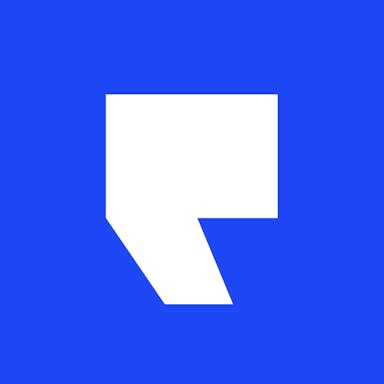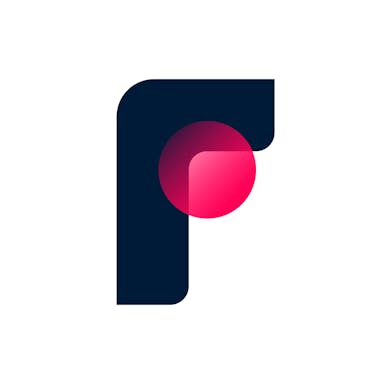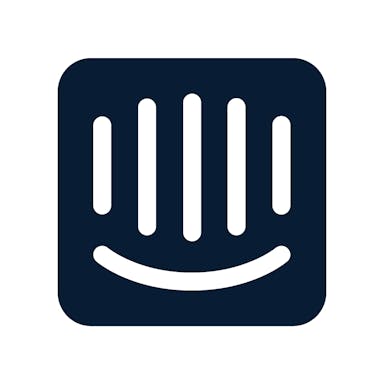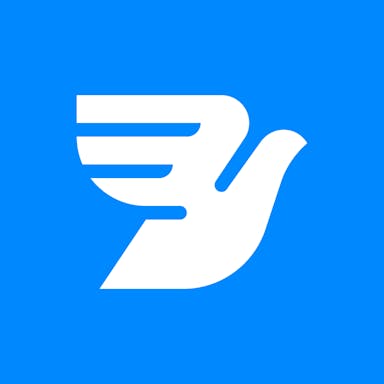Thesis
As of 2022, the US Chamber of Commerce reported there were 33 million small businesses in the US, accounting for over 99% of all US companies. Though small individually, these businesses accounted for 63% of the new jobs created in the U.S. between 1995 and 2021. Small businesses employ 46% of the private sector workforce and contribute 43.5% to the US GDP as of 2023. Small businesses are the backbone of the American economy. However, only 9% of small businesses exceed the threshold of $1 million in annual revenue as of January 2023. Many are local businesses that have been built and maintained on repeat customers and word-of-mouth referrals.
Small businesses face numerous challenges in effectively managing their customer interactions and online reputation. The advent of online review platforms such as Yelp has made customer feedback more influential than ever before. As of 2022, studies show that over 90% of consumers will look at the reviews of a given business before considering its products or services. Furthermore, 88% of consumers say that they trust online reviews as much as they would a friend or family member. Accruing a lot of positive reviews online has therefore become vitally important for most small businesses.
Many small businesses have historically viewed reviews as a one-way street, and not many businesses spent time responding to reviews or soliciting them. However, when Yelp introduced a feature that enabled companies to reply to reviews about their business in 2009, this began to change. Small businesses began to see online reviews as an important channel to engage customers. Online review platforms also began providing businesses with an opportunity to rectify issues and explain negative reviews, further incentivizing engagement by businesses. With new technology tools, businesses can approach reviews proactively and help shape their online reputation. For example, over 60% of consumers are likely to leave a review if the business follows up with a link asking for a review.
Podium is a customer communications platform that helps local businesses shape their online reputation, manage leads, and convert them into customers. Using Podium’s software platform, businesses can centralize all reviews and messages from customers into one place. In a world where online reviews are critical to small businesses, Podium provides tools to help businesses generate and manage online reviews and communicate with their customers via text message, among other functionalities.
Founding Story
Podium was founded in 2014 by Eric Rea (CEO) and Dennis Steele. Both co-founders had previous experiences with small businesses before founding Podium: Rea’s father had a tire shop when he was growing up, while Steele worked with local businesses at a PR and marketing firm immediately after graduating from BYU.
The idea for Podium came about when the pair realized that local businesses had a “huge gap” in the software they were using to grow their businesses. Online reviews for local businesses began to take off in 2012, and Rea’s dad was upset by the disparity of having lots of happy customers but getting negative reviews online. This gave Steele and Rea the idea that they could help the business by developing an application to text happy customers and solicit reviews.
As they began to design the application, they found themselves getting stuck; Rea had the idea to talk to another business owner other than Rea’s dad so that they wouldn’t be basing all of their decisions on untested assumptions. The person they ended up talking to was a local mechanic named Bob Sylvester, who ended up not only validating the pain point and expressing that “every business owner is going to want this” but also becoming Podium’s first paying customer. Steele described this meeting as a “moment of validation”:
“I think we thought, okay, we have something here. We can make this into something. There’s a huge need. And it happened to be the first business we talked to. So we got really lucky in that sense, but we held on to that for a long time because there was a lot of naysayers saying this was not the right space to go sell software into. But we held on to that, that feedback from Bob Sylvester.”
From there, the pair doubled down on the strategy of going directly to small businesses for both product feedback and to solicit potential customers. As Rea described it:
“Dennis and I would get up, work out together, and then go sell the MVP of our product door-to-door from 9 to 3 pm… We’d ask questions and get feedback from these local businesses the entire time. Then we went back to the spare bedroom of my apartment and took all of that feedback and wrote it into the product from 4 to 8 pm. After that, we were doing an online coding bootcamp to learn how to make it all work from 8 to 11 pm.”
This process created a tight feedback loop for Podium with its first customers and gave the founders the conviction that they were building something needed even though they talked to one successful entrepreneur who told them that it wouldn’t work. They also believed that local businesses would continue to play a major role in the future.
The result of this belief and its customer-centric process is a company that works with over 100K businesses as of November 2023, with the vast majority being small and local businesses. While it has partnered with some larger brands over the years, Podium’s DNA is very much intertwined with the problems and opportunities that small businesses face.
Product
Podium’s platform enables businesses to manage their online reviews, collect customer feedback, and interact with customers through messaging channels like SMS text messages, web chat, and social media. Customers pay a recurring subscription fee to access and utilize the platform and services, which are designed to help them improve their online reputation, streamline customer communication, and drive customer acquisition and retention.
Reviews
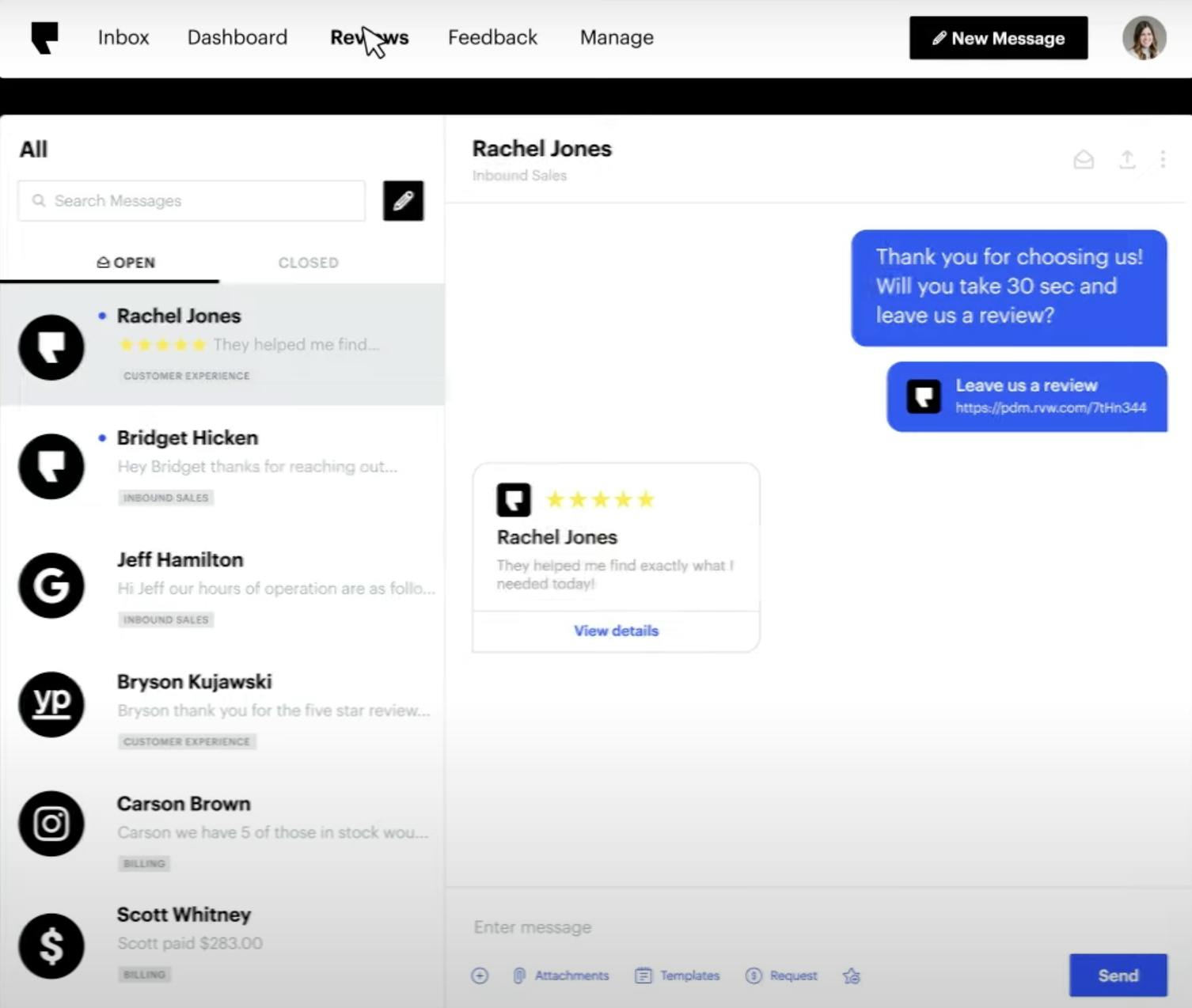
Source: Podium
Podium allows businesses to collect and manage online reviews from various platforms and directories in one central dashboard. It provides tools for requesting reviews from customers via SMS text messages or email, and businesses can respond to reviews directly through the Podium platform. Podium also provides automation tools for review invites and AI-powered response suggestions to customer suggestions.
Website Chat
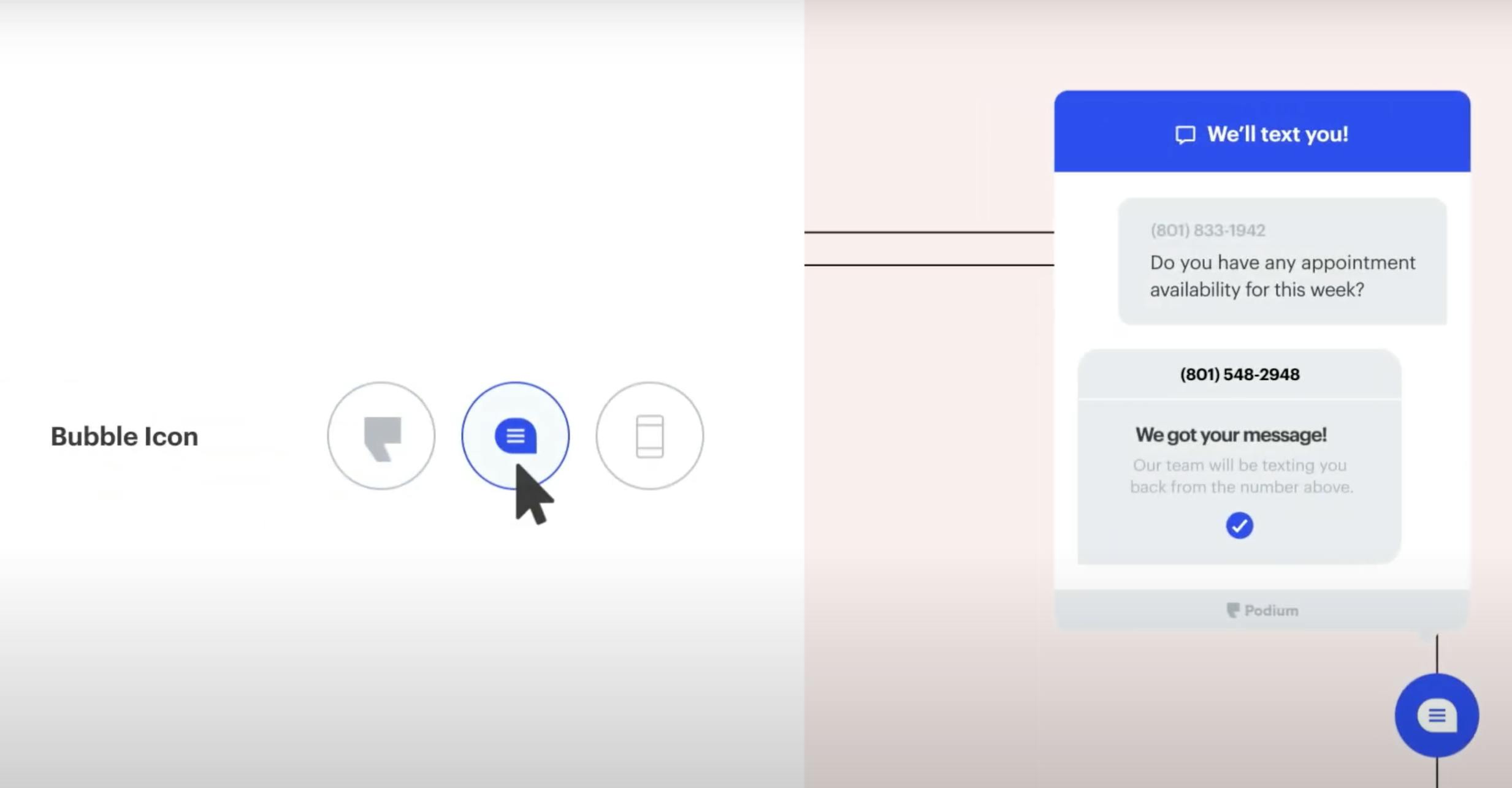
Source: Podium
Podium provides businesses with a webchat feature that can be embedded on their websites. This feature enables customers to initiate conversations with the business directly on the website for customer engagement and support. Podium says that Webchat enables businesses to generate “up to 11x more inbound leads” from their websites by helping businesses connect with their customers and collect information on leads. Webchat conversations can be managed from the same inbox as other Podium features, such as text marketing.
Text Marketing
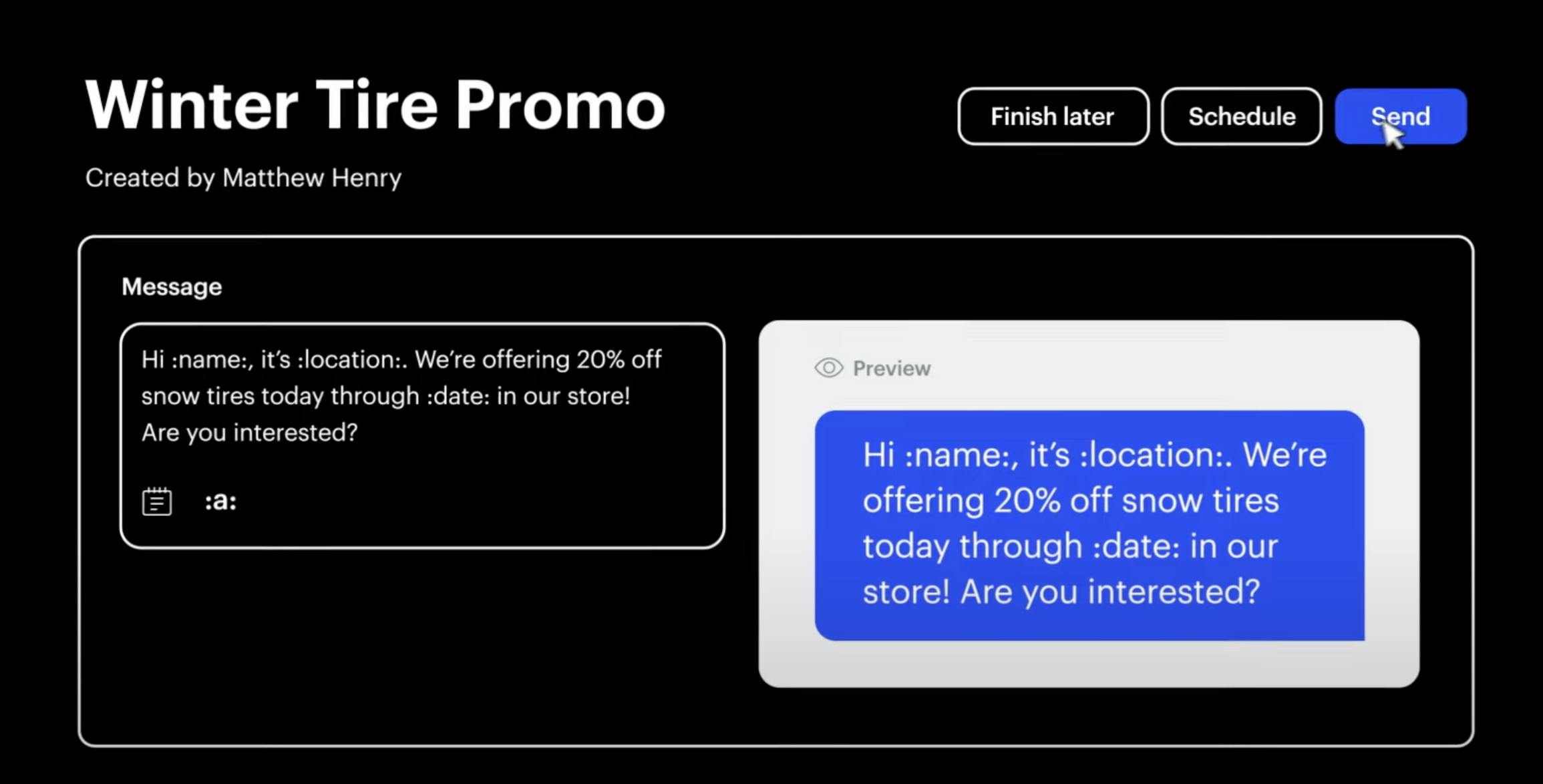
Source: Podium
According to a July 2019 consumer behavior study by EZ Texting, a mobile marketing software company, consumers opened 90% of texts within 30 minutes. Podium claims to have a 98% open rate on the text messages it helps its customers send, which is 4.5x more than the average open rate for emails. Podium helps its customers set up text marketing campaigns and offers tools to automate campaign structure. It also allows text campaigns to target specific groups of customers with personalized offers or messages and rules-based automation for text marketing campaigns to reduce repetitive tasks.
Inbox
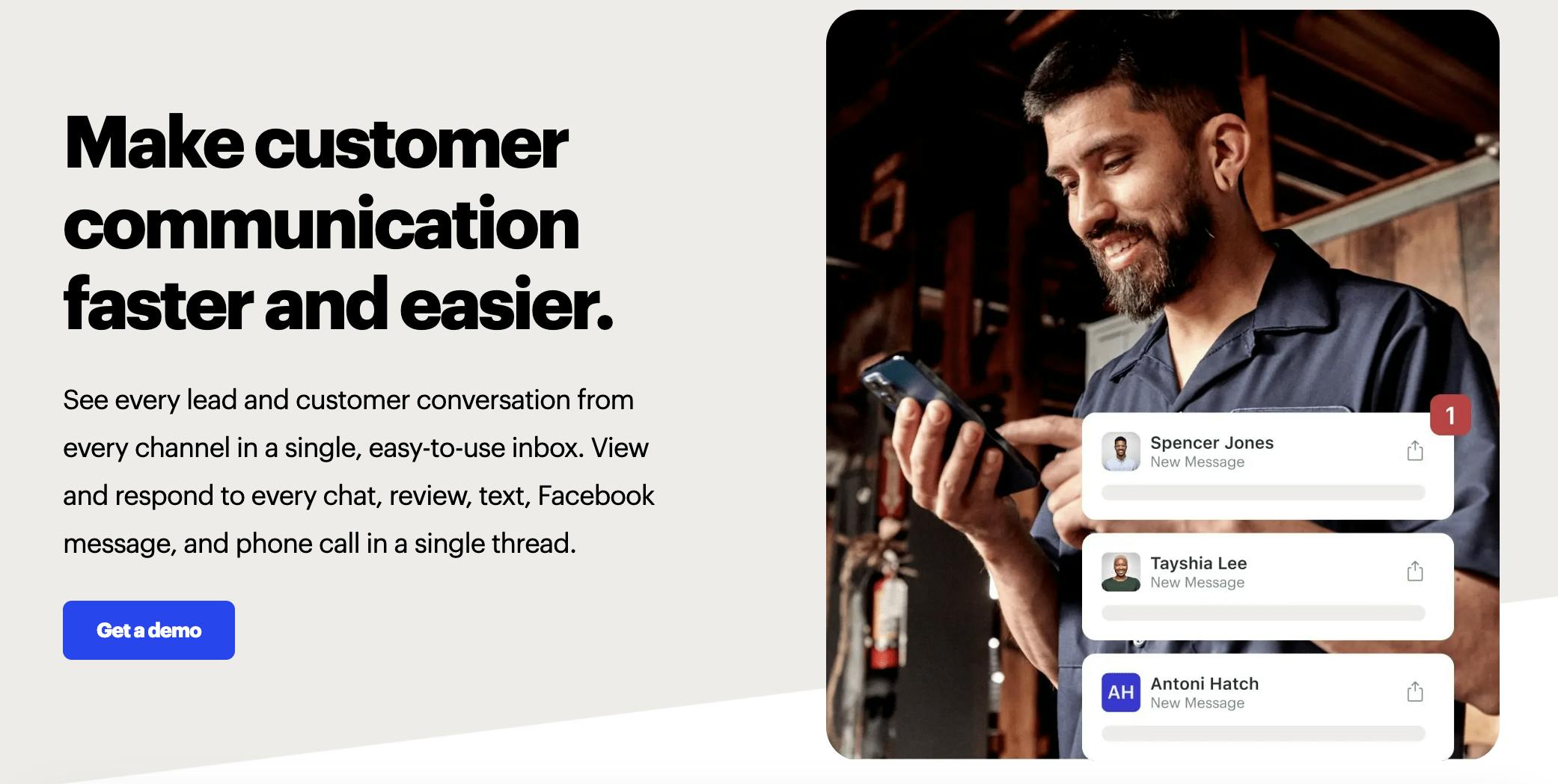
Source: Podium
Podium's messaging platform enables businesses to communicate with customers through various channels, including text messages, website chat, and social media messaging. Customers engage with companies across dozens of different platforms and through many different mediums, so Podium aggregates all of this into one dashboard. Podium therefore gives small businesses one centralized inbox where they can see and respond to messages across all the platforms and channels where they are active. This feature is intended to help businesses to engage with customers, answer inquiries, and address concerns in real time.
Phones
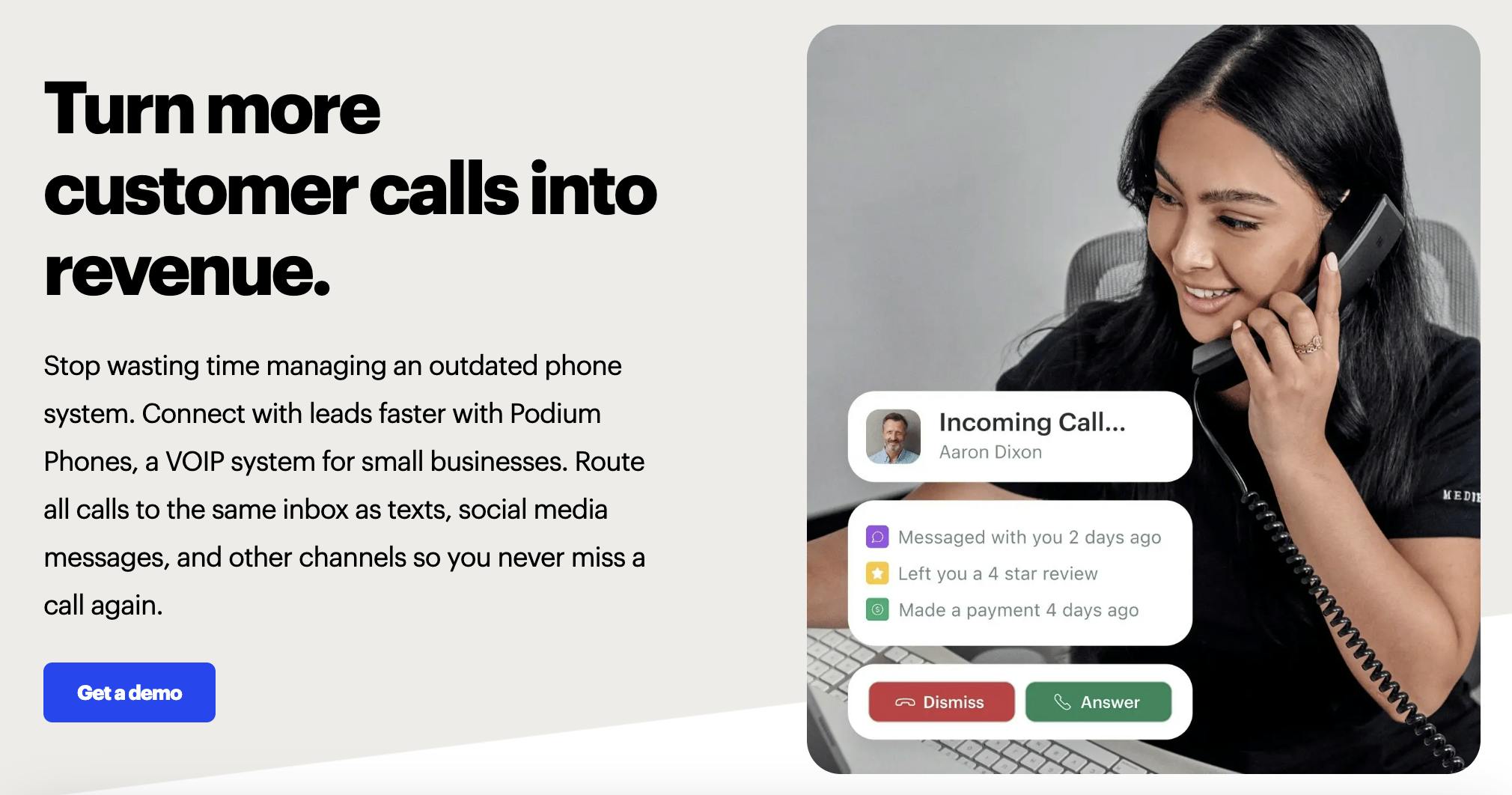
Source: Podium
According to a 2022 study, 69% of customers still prefer to speak over the phone for customer service-related conversations over other channels such as chat and text. Podium has a Voice Over Internet Protocol (VOIP) system for small businesses which helps them route all calls to the same inbox as texts, social media messages, and other channels. It also lets users see calls in the context of customers’ messaging history including previous texts, Webchats, and other customer communications.
Contacts
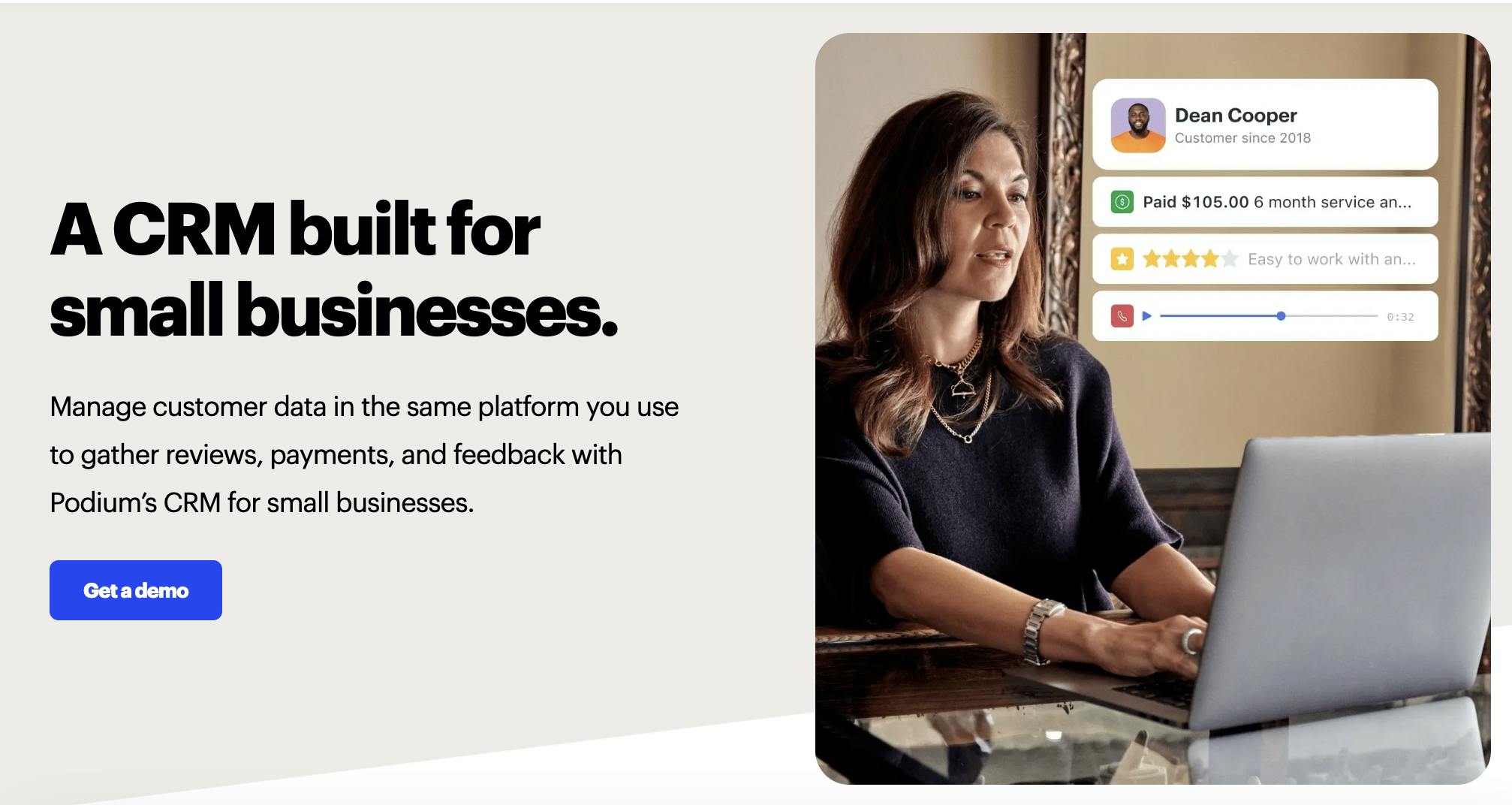
Source: Podium
Described by Podium as “a CRM built for small businesses”, this feature allows Podium’s customers to manage relationships with their customers. It allows users to manage customer data in the same platform they use to gather reviews, payments, and feedback. It also allows for the creation of customer profiles, including a history of customer interactions and conversations from every channel within a single view. It also allows users to customers to tag customers with various attributes.
Payments
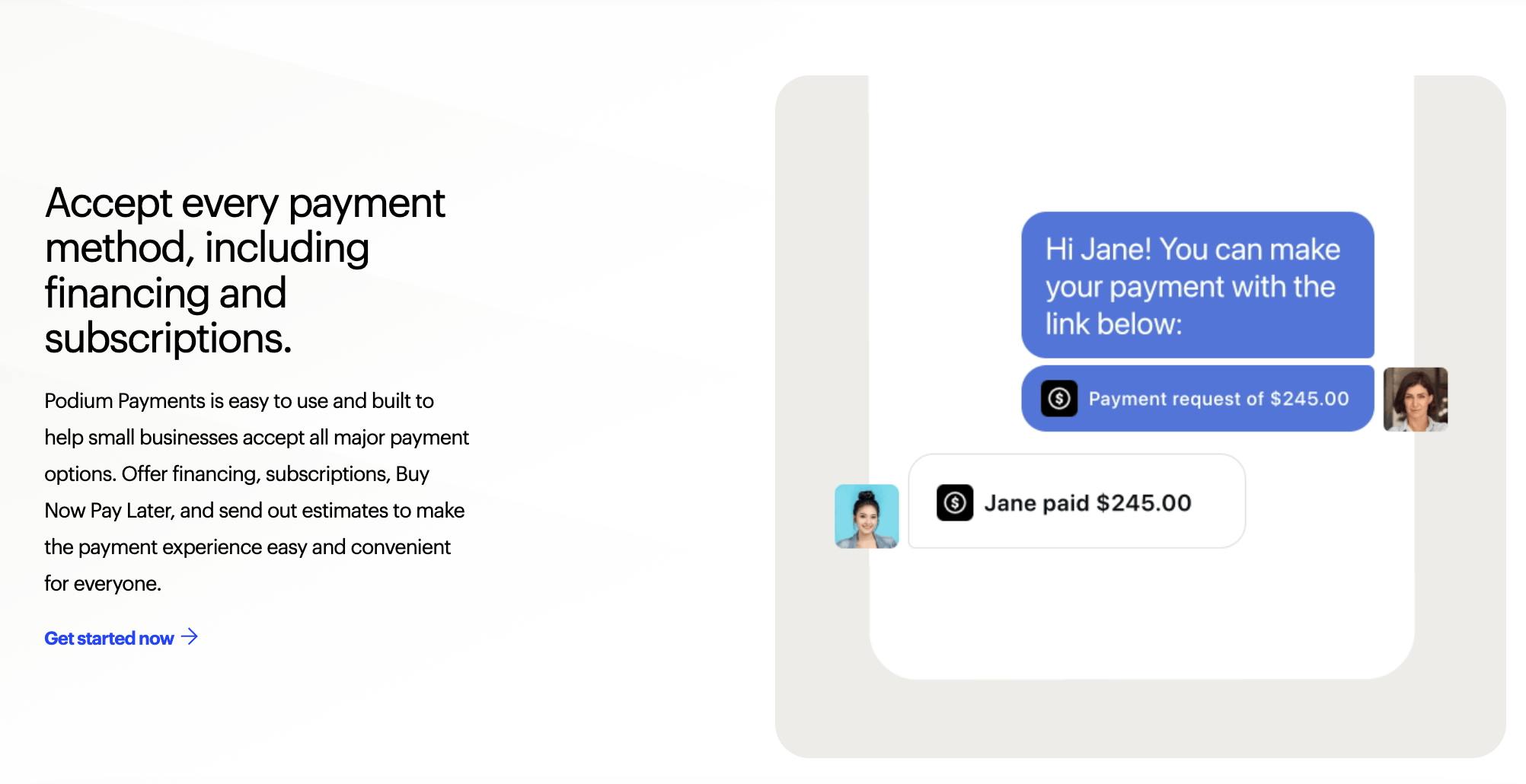
Source: Podium
Podium allows users to collect payments from customers with an option to turn phones into physical card readers and the option to text customers payment links. The payments feature can be used to accept all major payment methods, including financing, subscriptions, and BNPL. The feature also comes with fraud protection and automatic reconciliation.
Surveys
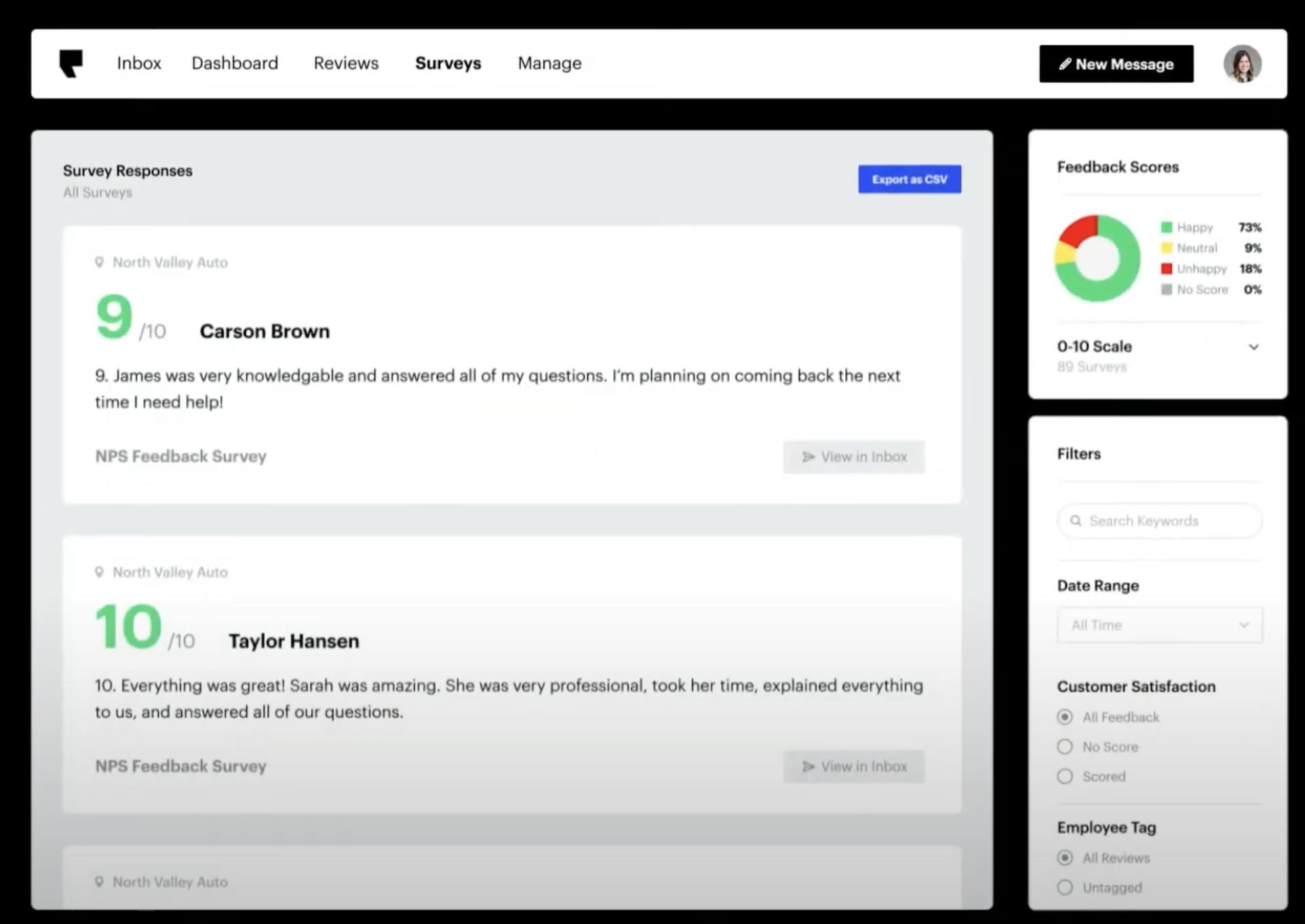
Source: Podium
Podium allows businesses to survey customers directly through text messages to arrive at an NPS score and receive feedback on the customer’s experience. Podium’s survey feature allows businesses to survey customers without emails or links with two quick text messages, i.e. “surveys that feel like conversations”, with the intent of reducing friction and response time while increasing response rate.
Market
Customer
Podium’s target customers are largely local small businesses, but the company also works with larger organizations like the Utah Jazz and Real Salt Lake, two professional sports franchises in its home state of Utah.
Small businesses have historically been slow to adopt new technologies. However, consumers have increasingly grown to expect easy communications with businesses, whether for customer support or to learn more about a company’s products. As a result, messaging tools have become table stakes for running a successful business.
The company noted that the COVID-19 pandemic was an inflection point for small businesses’ adoption of its messaging tools, stating in a 2020 interview that:
“Since the COVID-19 crisis, messaging has quickly become one of the only ways small and local businesses can do business. This giant shift is most likely going to permanently alter the way that people make buying decisions, and will only increase the need for local businesses to run their business using Podium.”
At the time of this interview in April 2020, at the beginning of the COVID-19 pandemic, Podium was working with 45K small businesses; this had grown to over 100K businesses by 2023. In particular, Podium targets the following industries: automotive, retail, home services, professional services, healthcare, and dental.
Market Size
The online reputation management market in particular was valued at $226.4 million in 2023, and is expected to grow to $504 million by 2028, a 14.3% CAGR. However, this is just one component of what Podium offers, with other relevant markets including CRM services (valued at $71.1 billion as of 2023), text message marketing (valued anywhere between $5.8 billion and $64.5 billion in 2021), and customer service software ($10.5 billion as of 2021).
Small businesses accounted for 43.5% of the US GDP according to a report from April 2023. Assuming that a similar portion of markets relevant to Podium are made up of small businesses as to the economy as a whole, Podium’s total addressable market can be roughly estimated as 43.5% of the sum of all the markets listed above, which yields a total estimate of between $38.1 billion and $50.9 billion. In total, small businesses contributed over $10 trillion to US GDP in 2022.
Competition
Birdeye: Birdeye is a customer experience platform founded in 2012 that helps businesses manage their online reputation, collect and monitor customer reviews, and gain actionable insights. It provides tools to improve customer interactions and drive business growth. Both Birdeye and Podium offer reputation management solutions and help businesses collect and manage customer reviews. However, Birdeye has additional features for small businesses that Podium does not such as a virtual receptionist, business profiles, online listings, and referrals.
Birdeye has raised $93 million in funding as of November 2023. Its most recent round of funding was a $60 million Series C in March 2022 led by Accel-KKR at an undisclosed valuation, at which time the company was serving 80K local businesses versus the more than 100K businesses using Podium as of November 2023.
Reputation: Reputation is a comprehensive online reputation management platform founded in 2006 that enables businesses to monitor, manage, and improve their digital reputation. It provides tools for review management, sentiment analysis, social media monitoring, and customer experience insights. As of January 2022, it has raised a total of $210.6 million as of November 2023, with its most recent round being a $150 million growth equity round led by Marlin Equity Partners. At the time of this equity raise, Reputation reported that it had surpassed $100 million in ARR.
Though Podium and Reputation offer many similar services, Reputation is much more focused on mid-market and enterprise customers. Reputation also provides a more comprehensive suite of services, including social media monitoring and sentiment analysis, while Podium focuses on customer messaging and communication.
Swell: Swell is a customer feedback and review management platform founded in 2015. It was designed to help businesses gather customer insights and enhance their online reputation. It offers tools for managing reviews, surveys, and referrals to improve customer satisfaction and drive growth.
Swell has raised $14.9 million as of November 2023, with its last round having been an $8 million Series A at an undisclosed valuation led by SkyLab Ventures in March 2021. Swell offers similar products to Podium but its customer mix is much more healthcare-centric. A former VP of Sales at Podium estimated that Podium’s penetration in the healthcare space was less than 2% but viewed it as a valuable market.
WhatsApp (for business): WhatsApp, which is owned by Meta, is a messaging service used by 2.8 billion people as of 2023 to chat with friends and family. It was the most popular messaging app in the world as of 2022, which gives it a large global reach. WhatsApp has also become a popular tool for businesses.
WhatsApp launched an app for businesses in 2018 and has platforms for both small and enterprise businesses. Businesses adopted WhatsApp for its messaging reach and ease of use, but have since begun using WhatsApp to help grow their businesses. WhatsApp offers tools to create a digital storefront within the app so customers can order by sending a message, the ability to set up messaging campaigns, and integrations with other Meta ads products.
Meta acquired WhatsApp for $19 billion in 2014 and has since monetized the app on the back of a free-to-use model. While WhatsApp isn’t the preferred means of text messaging in the US at only 41% market penetration as of 2023, it is the preferred means of communication in much of the world. This has helped it reach an estimated annual revenue of $800 million in 2022. While WhatsApp is used by large companies such as Vodafone and Estee Lauder, it presents competition to Podium on the small business front as well because of its scale.
Business Model
Podium is a SaaS business that makes money by charging its customers a recurring fee monthly or annually. Podium offers three tiers: “Essentials” ($289 per month), “Standard” ($449 per month), and “Professional” ($649 per month).
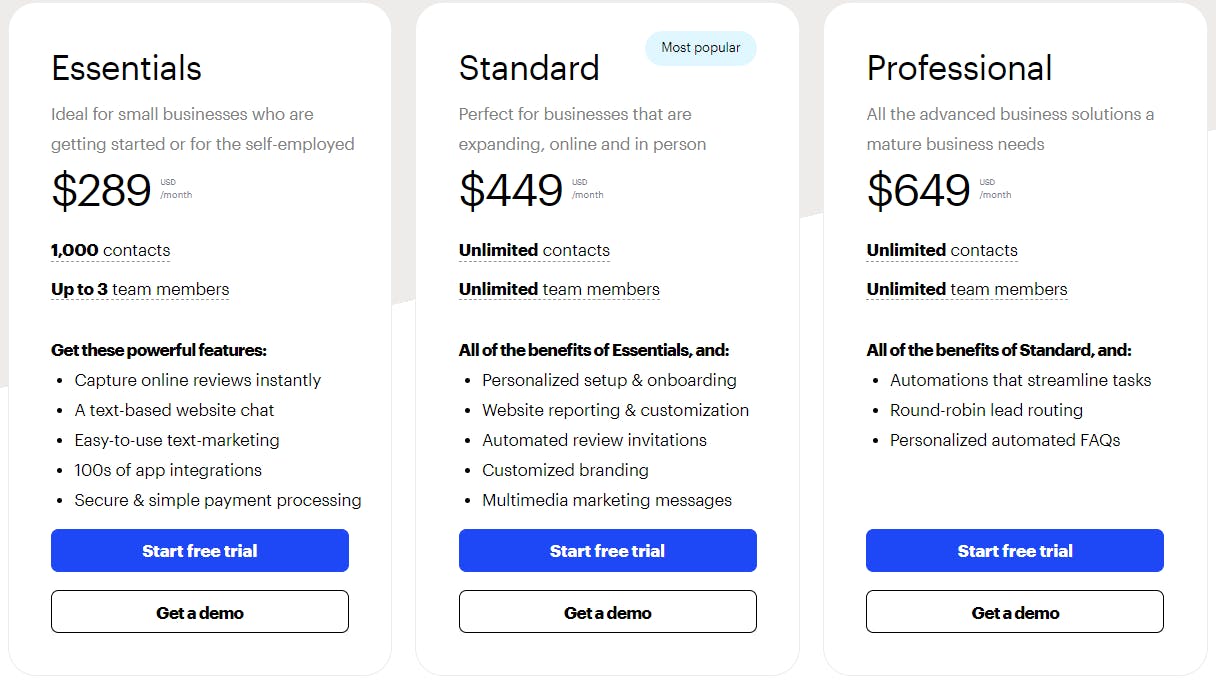
Source: Podium
Unlike many of its competitors, Podium does not cap the number of messages a business can send through its platform. However, it does cap the number of contacts a business can send messages to in its lowest-tier offering, thus incentivizing businesses to keep a consistent engagement with their customers even as they may pay more as they grow into Podium’s higher tiers.
Podium has also launched a full payments offering, which includes physical card readers and infrastructure for payment via text message. Podium takes a portion of transactions in the 2.5% range, working much like credit card interchange fees. It also charges a flat $0.30 fee for all transactions.
Traction
Podium was named to Forbes’s Next Billion-Dollar Startups 2018 list, at which time the company’s annual revenue was estimated at $60 million. It was also named to the Forbes Cloud 100 four times: in 2018, 2020, 2021, and 2022 (but not in 2023). It was also included in Fast Company’s World’s Most Innovative Companies in 2019.
Podium works with over 100K businesses as of November 2023. When it announced its Series D round in November 2021, it also reported it had achieved $130 million in ARR. In December 2022, Podium laid off 12% of its staff, citing growing economic uncertainty.
Valuation
As of November 2023, Podium has raised a total of $419.1 million in funding. It raised a $201 million Series D in November 2021 at a valuation of over $3 billion. The round was led by YC Continuity with participation from Durable Capital Partners, Arpex Capital, Accel, Album VC, IVP, Sapphire Ventures, Summit Partners, and Sorenson Capital.
Key Opportunities
The Size of the Small Business Market
Podium currently serves 100K businesses, which is only a small portion of the over 33 million small businesses in the US. Before even expanding into new products and offerings, Podium has a lot of room for growth in this target market. Podium’s motto is “the future is local,” which reflects its belief that local small businesses will continue to serve as a big part of the economy.
A 2021 survey showed that 93% of Americans believed shopping locally was more important than ever. With the COVID-19 pandemic and the ensuing rise of remote work as a catalyst for more than 2 million Americans moving out of big cities, small businesses serving local customers have a historically unique advantage to take advantage of that geographic dispersion, even amidst the ongoing growth of digitization and ecommerce.
Targeting Larger Organizations
Though Podium has partnered with larger organizations like the Utah Jazz, enterprise clients still only make up 4.7% of its client base according to one estimate as of 2023. Despite this, the products Podium has built have potential value for large businesses; value that has been proven by its existing larger partnerships.
For example, the Utah Jazz was worth almost $3.1 billion as of October 2023, with $274 million in revenue. Ty Wardle, Vice President of Ticket Sales and Services with the Utah Jazz, said in 2020 that:
“Podium is now our go-to for payments, not just for Webchat leads, but for any payment with a fan… We went from spending two to five minutes per phone call trying to collect payments for tickets to just sending a convenient text. Not only does that make our team way more efficient, but it has improved our ticket buying experience to being one of the best in the NBA.”
There are 29 other NBA teams in a league that surpassed $10 billion in annual revenue in 2022. Not only is this an opportunity in and of itself for Podium, but professional sports franchises are also often champions of local businesses themselves, which aligns well with Podium’s mission. Other teams in other sports leagues, and potentially other larger organizations, could also benefit from Podium’s product value and it could expand its focus to encompass such organizations.
Key Risks
Economic Pressures on Small Businesses
Most of Podium’s business is tied to the sustainability and growth of small businesses. About 33% of all small businesses shut down permanently as a direct result of the COVID-19 pandemic. The economic downturn that followed in the post-pandemic period compounded these problems. In December 2022, Podium announced it had laid 12% of its staff and was going to sublet some of its office space as a result of broader market conditions. Going forward, Podium will likely have exposure to market cycles because small businesses are often the first to go under when pressured by economic volatility.
Spreading Too Thin
Podium has expanded to so many products beyond just reviews and interaction management that it may struggle to maintain the resources to be competitive across its increasingly wide array of products including payments, which is an especially competitive market. As it seeks to expand its addressable market and create a more comprehensive platform, it must be careful not to detract from its core product differentiation and target customer experience.
Summary
Reviews and initial interaction with a prospective customer are mission-critical for any business, but especially small businesses. Getting a customer review is not entirely out of the control of a business, and providing a good service, product, and experience is not enough to guarantee great reviews. Businesses have proven they can generate sales and growth by being proactive in driving positive reviews, turning customers into advocates, and thus treating reviews and customer experience as valuable marketing channels. Podium has built a platform that has helped thousands of small businesses and it sees many opportunities to expand offerings to these customers.
